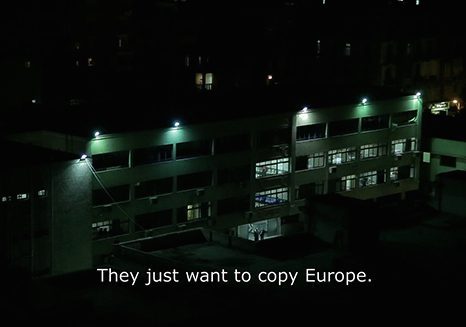Beirut, Cairo, Egypt
10 Mar 2015 - 07 Apr 2015

Jasmina Metwaly and Philip Rizk, Out on the Street (still), 2015. Film, 71 minutes. Courtesy the artists and Beirut.
In collaboration with the artist/filmmaker duo Jasmina Metwaly and Philip Rizk, Beirut presents a program of film screenings, talks, and discussions, throughout the months of March and April.
The program is inspired by their ongoing research that uses as a starting point the conditions of work, labor and revolt, and which has culminated into their most recent film Out on the Street (2015). The film premiered at the Berlinale in Berlin earlier this year, and will be presented at the German Pavilion at the forthcoming Venice Biennale. How to Act: On Stages and Storytellers follows a series of tangents departing from Metwaly and Rizk’s references, from classical cinematic works to the current practice of activists, artists, scholars and researchers in Egypt and elsewhere.
Anthropologist and filmmaker Mark Westmoreland will set off the program in conversation with Metwaly and Rizk, featuring excerpts from Peter Watkins‘s historical drama La Commune (Paris, 1871) (2000). The filmmakers will show clips from their recent production Out on the Street (2015) as part of the discussion. The following event will be dedicated to screening La Commune in its entirety, complete with English and Arabic subtitles. Later in March, filmmaker and editor Louly Seif will take a closer look at the language and logic of filmmaking, and the construction of (political) narrative through montage. Seif is also the editor of Out on the Street. On the fourth evening, anthropologist and researcher Dina Makram Ebeid is invited to elucidate some of the social relations that emerge within the working space of the factory, particularly the paternalistic relationships that evolve between workers, speaking about the specific case of the Egyptian Iron and Steel Company in Helwan. Makram Ebeid’s talk will be coupled with a screening of Jia Zhangke‘s film 24 City (2008), a film about a state-owned factory building in China’s Chengdu, which through its experimental form explores the social relations within the workspace of a factory and its surroundings.
How to Act: On Stages and Storytellers is an opportunity for researchers, artists, filmmakers, film editors and theorists, and other publics, to closely engage with the thought and practice that informs the field of experimental performance of opposition. Together we aim to study the roles of re-enactment, theater and film montage, as ways of telling stories about political struggles. The talks, films and discussions become a site from which we can understand the rubrics of global structural failures, politically and economically, from the vantage point of the local and the singular: the family, the factory, the institution and the state.
Participants: Jasmina Metwaly & Philip Rizk, Dina Makram Ebeid, Louly Seif, Peter Watkins, Mark Westmoreland, Jia Zhangke
FULL PROGRAMME:
TUESDAY, 7 MARCH 2015
8pm Talk and Film Screening: The talk with Anthropologist and researcher Dina Makram Ebeid and screening of “24 City” (112 min., 2008) by Jia Zhangke. The event will be held in Arabic. ’24 City’ with Arabic subtitles.
TUESDAY, 10 MARCH 2015
8pm Conversation: Mark Westmoreland, documentary filmmaker and professor of Anthropology, with Philip Rizk and Jasmina Metwaly. This event will be held in English. ‘La Commune’ with English and Arabic subtitles.
SATURDAY, 21 MARCH 2015
6pm Film Screening: “La Commune” (345 min., 2000) by Peter Watkins. Film with Arabic and English subtitles.
TUESDAY, 31 MARCH 2015
8pm Conversation: Louly Seif and Jasmina Metwaly. An editor and a filmmaker in discussion. The event will be held in Arabic.
The Imaginary School Program is in session until summer and is supported by Arts Collaboratory, Goethe Institute and Beirut.
Beirut exists throughout the spring of 2015 with the generous support of the Young Arab Theatre Fund.